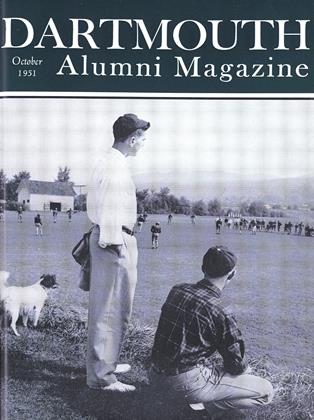by E. Grant Meade '36. King'sCrown Press, 1951, pp. xii, 281, $3.75.
This is a report of American military government in Korea during 1945-1946, the first year of the occupation of that unhappy land. The author writes as a student of political science and as a participant in the occupation. Before entering the Navy he did graduate work at Wisconsin. Following several years of combat experience in the Pacific, he received training in schools of military government at Princeton and Harvard and then was assigned to Korea. After the war he taught at Haverford and found time to write this book; he has since returned to active naval duty.
The book will be of interest to many for the insights which it provides into the critical initial phase of Korean liberation, when both Soviet and American policies were taking shape within a mold which was to lead in 1950 to communist aggression and United Nations retaliation. Primarily, however, it is an analysis of the military government operation in Korea, and is a significant contribution to the growing literature in this field. The author achieves his purpose remarkably well by balancing a detailed account of developments in the single province in which he served against a more general picture of the whole American zone and in relating both to the broader pattern of American foreign policy. His observations on preparations for the occupation, selection and training of personnel, relationship of military government to tactical forces and the higher command, and other fundamental problems of military government will be of real value to those concerned with plans and operations in this important phase of military activity.
The author gives due credit to American achievements in restoring local administrative and educational facilities, improving sanitation, rehabilitating transportation, communications and the fishing industry, reclaiming arable land, improving flood control, and initiating a reforestation program. But in the political field he is cautiously critical. He believes that our proclaimed objective of bringing democracy to Korea was severely handicapped by preoccupation with the attempt to build a bulwark against communism. This led us to turn against moderate and leftist leaders who were not communists, but who reflected the genuine yearnings of the majority of the people for land reform, termination of foreign influence, extension of suffrage, and nationalization of natural resources. Instead we supported a conservative rightist minority primarily interested in preserving its own dominant position and instituted practices which many Koreans found as distasteful as the former Japanese rule. The book shows that while we Americans excel in applying the benefits of our tremendous material progress, we still have things to learn in developing the spiritual maturity which will enable us to deal successfully with other peoples.
(Continued on Page 10)
 View Full Issue
View Full Issue
More From This Issue
-
 Article
ArticleTHE COLLEGE
October 1951 By C.E.W. -
 Article
ArticleThe Moral Supports or Education
October 1951 By C.E.W. -
 Class Notes
Class Notes1918
October 1951 By ERNEST H. EARLEY, DONALD L. BARR -
 Article
ArticleDr. Percy Bartlett '00m
October 1951 By FREDERIC P. LORD '98 -
 Class Notes
Class Notes1950
October 1951 By ENS. SCOTT C. OLIN, USN, SIMON J. MORAND III -
 Article
ArticleAssociated School News
October 1951 By Karl Hill
Books
-
 Books
BooksLittle Theater Organization and Management
MAY 1927 -
 Books
BooksSparing No Expense
June 1975 By JEFFREY HART '51 -
 Books
BooksBriefly Noted
MARCH 1971 By JOHN HURD '21 -
 Books
BooksTHE DREAMER OF DEVON
November 1932 By John Hurd Jr. -
 Books
BooksLEVOLUTION DE LA LITTERATURE FRANCAISE
February 1937 By P. O. Skinner -
 Books
BooksOUR ENVIRONMENT CAN BE SAVED.
FEBRUARY 1971 By ROBERT L. LOEB '21

